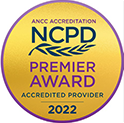Continuous Glucose Monitoring: The Basics
Monitoring blood glucose levels is absolutely imperative for patients with diabetes. Learn more about continuous glucose monitoring (CGM) devices and improving diabetes management. Start the course today and earn CNE credits too!
Course Details
Overview
Blood glucose self-monitoring helps patients with diabetes understand the interrelationships among food, activity, and medication and to achieve their glycemic targets. Patients continue to use blood glucose meters, but in the early 2000s, continuous glucose monitoring (CGM) revolutionized home monitoring. CGM devices comprehensively optimize diabetes management by reviewing activity levels, medication and insulin dosing, food intake, and stress to provide patients with information about how self-care decisions affect glucose levels. As CGM accuracy, reliability, and convenience continue to improve, more healthcare providers use them.
The American Association of Clinical Endocrinology (AACE) and the American Diabetes Association (ADA) recommend CGMs for all patients with diabetes who administer multiple (three or more) injections of insulin per day or use of an insulin pump. Although most patients continue to use self-monitoring and inject insulin, CGM provides an accurate picture of glucose levels throughout the day and night, which allows patients to quickly assess glycemic patterns to prevent hypoglycemia. CGM devices also capture information that help providers create treatment plans based on real-time glucose results and to remotely view glucose values 24 hours a day.
Key Learning Outcomes
- Describe continuous glucose monitor (CGM) device options and the differences between personal and professional devices.
- Describe how CGM helps improve diabetes management.
- Discuss nursing implications in caring for patients using CGM devices.
Presented by:
James A. Fain, PhD, RN, BC-ADM, FADCES, FAAN
James A. Fain is associate dean for academic affairs at the University of Massachusetts Chan Medical School, Tan Chingfen Graduate School of Nursing in Worcester, and editor-in-chief of The Science of Diabetes Self-Management and Care.
